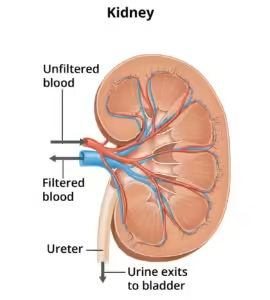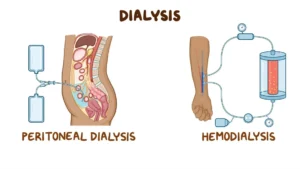Kidney health is a crucial aspect of overall well-being that is often overlooked until problems arise. Our kidneys play an essential role in filtering waste from the blood, maintaining fluid balance, regulating blood pressure, and supporting overall bodily functions. Unfortunately, kidney disease is on the rise globally, with millions affected by conditions ranging from chronic kidney disease (CKD) to kidney failure requiring dialysis or even a transplant. In this article, we’ll explore how to understand kidney health, prevent disease, and what options are available for those facing kidney failure.
The Importance of Kidney Health
The kidneys, located on either side of the spine, are responsible for filtering around 50 gallons of blood daily. They remove waste, excess fluids, and harmful substances from the body, while also regulating essential functions like blood pressure and red blood cell production. When the kidneys fail to perform these functions effectively, the body becomes vulnerable to various health complications.
Kidney disease can be insidious, with symptoms often appearing only once significant damage has occurred. Regular checkups and awareness of the early warning signs are key to preserving kidney health for as long as possible.

Preventing Kidney Disease
Preventing kidney disease starts with taking proactive steps to maintain your overall health. Some key lifestyle changes and habits can go a long way in protecting your kidneys:
1. Manage Chronic Conditions
Conditions like diabetes, high blood pressure, and heart disease are among the most common causes of kidney disease. Managing these conditions with proper medication, diet, and regular medical checkups can prevent kidney damage. Keeping your blood sugar and blood pressure within recommended levels is crucial for maintaining kidney function.
2. Stay Hydrated
Drinking enough water is essential for kidney health. Water helps flush out toxins and waste from the body. However, individuals with existing kidney disease may need to adjust their fluid intake depending on their condition, so it’s important to follow medical advice.
3. Eat a Kidney-Friendly Diet
A diet low in sodium, processed foods, and unhealthy fats can reduce the risk of kidney disease. Incorporate more fruits, vegetables, and whole grains into your meals. For those with kidney disease, a renal diet prescribed by a healthcare provider may be necessary to avoid excess potassium, phosphorus, and protein intake. Learn more here.
4. Avoid Excessive Use of Painkillers
Overusing over-the-counter pain medications, particularly non-steroidal anti-inflammatory drugs (NSAIDs), can put strain on the kidneys. Always use medications as directed and avoid prolonged use without guidance from a healthcare provider.
5. Regular Health Checkups
Routine blood tests, urine tests, and blood pressure monitoring are essential in detecting kidney problems early. Early detection of conditions like high blood pressure or diabetes can help you take action before kidney damage occurs.
Dialysis: A Lifeline for Kidney Failure
For patients who experience chronic kidney disease or kidney failure, dialysis becomes a critical treatment option. Dialysis is a procedure that artificially removes waste products and excess fluids from the blood when the kidneys are no longer able to perform this function. There are two main types of dialysis:
1. Hemodialysis
Hemodialysis involves using a machine and a filter, known as a dialyzer, to clean the blood outside the body. Blood is drawn from the patient’s body, cleaned through the machine, and returned to the body. Hemodialysis typically requires patients to visit a dialysis center three times a week, although at-home options may be available for some.
2. Peritoneal Dialysis
Peritoneal dialysis uses the lining of the abdomen (the peritoneum) as a natural filter. A special fluid is introduced into the abdomen to absorb waste and excess fluids, which are then drained out of the body. This type of dialysis can often be performed at home, offering more flexibility for patients.
While dialysis can extend life, it is not a cure for kidney disease. Kidney transplants are often considered for patients whose kidneys can no longer function effectively through dialysis.

Kidney Transplant: A Hopeful Option
A kidney transplant is often the next step for individuals with end-stage kidney failure. A kidney transplant involves receiving a healthy kidney from a donor—either a living donor or a deceased donor. Transplants offer the possibility of a full recovery and a better quality of life compared to long-term dialysis, as they restore normal kidney function.
1. The Transplant Process
The kidney transplant process begins with a thorough evaluation to ensure that a patient is a good candidate for surgery. This includes tests to assess kidney function, overall health, and any potential complications. Once a match is found, the surgery is performed to place the donor kidney into the patient’s body. The recovery process can take several weeks, and ongoing medications are required to prevent rejection of the new kidney.
2. Living vs. Deceased Donors
Living kidney donors may be family members, friends, or even anonymous donors who are willing to give one of their kidneys to someone in need. Deceased donor kidneys come from individuals who have passed away and whose families have consented to organ donation. Both sources of kidneys have their pros and cons, but both can save lives and offer a better quality of life for transplant recipients.
3. Post-Transplant Care
After a transplant, patients will need to take immunosuppressant medications to prevent the immune system from rejecting the new kidney. Regular checkups, including blood tests, are also essential to monitor kidney function and overall health.
Living with Kidney Disease: Hope and Support
Though kidney disease can be a challenging and life-altering condition, advances in medical treatment, including dialysis and kidney transplants, offer hope for patients. Early detection, lifestyle changes, and appropriate treatment options can significantly improve the quality of life for those affected by kidney disease.
If you or a loved one are facing kidney disease, consult with a healthcare provider to discuss available treatment options, lifestyle modifications, and ways to stay healthy and manage the condition. Kidney disease is serious, but with the right care and support, individuals can live fulfilling and healthy lives.
